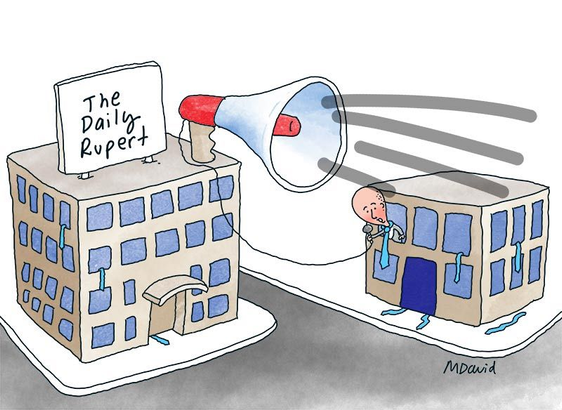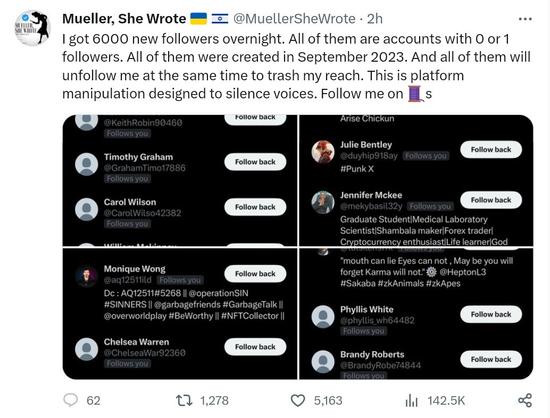Ok now that #AWeeekOfSilence is over. I just want to say again, #Australia, seriously:
"Inside #TheVoice campaigns: how muddled messages and voter confusion led to a crushing defeat"
#Referendum2023 #propaganda #misinformation #disinformation #racism #HateSpeech #auspol
You know the way you think about people who voted No to #TheVoice #Referendum2023? You perhaps think that through their choices when exercising their freedoms, they are contributing to the ongoing marginalisation and suffering of a minority group, who already have things hard as it is.
Right?
That's exactly how the #Immunocompromised #Immunosuppressed community thinks about you when you exercise your freedoms to participate in group activities without a #Mask.
How the media failed Australia in the #Referendum2023 campaign for #TheVoice.
"The #ABC found itself unable to guide its listeners and viewers as to what was fact and what was fiction."
As a Australian from a migrant background it is hard to truly understand the hardships and blessings that First Nations people experience. I can empathise, but I can never truly sympathise (share the feeling). My identity is not connected to the land I come from.
A ‘First Nation’ person’s identity is inseparable from the land they come from. It’s not merely Aboriginal and Torres Strait Islander people. It’s people of many Aboriginal and Torres Strait Islander nations.
The ‘Stolen Generation’ was literally an attempt of kidnapping and dispossessing Indigenous people from the lands they held deep-rooted connections with.
To this modern day, we (the Australian public representated by corporation and government) continue to attempt to demolish places of cultural importance or relocate populations, as if ‘that’s the solution’. The ‘Stolen Generation’ never ended - it simply stopped being official, and stopped targeting people directly.
And we wonder why there’s a massive difference in the referendum between the heavily ‘Yes’ voting Indigenous communities and the rest of the country?
I guess you take your identity for granted. Never had to forcibly renounce your identity and who you are. Never had to fight for your community, because you can just move on. Never felt the need for a constitutionally protected ‘voice’ to make sure your community is heard, because your individualism says ‘It’s not my business’ ‘It doesn’t affect me’.
Of course you take it for granted. First Nation people disproportionally have laws and policies enacted against them, unlike all other ethnic groups in Australia. The closest thing that Australians from migrant backgrounds have experienced is ‘Operation Fortitude’ in Melbourne, 2015. (There were many others policies that never got to implementation, thanks to the thankless work of civil rights and migrant/refugee right groups.)
Who will be the next minority group that is targeted, and claimed to be ‘causing division’ when the division was already there and the majority group simply don’t want to ‘close the gap’.
With the results of this referendum, the nationalists movement in Australia, and Foreign states, have confirmed that many Australian minority groups are willing to turn a blind eye on rights issues of other minority groups. So, don’t be surprised if you’re next.
#HumanRights
#FirstTheyCame #HistoryRepeats
#VoiceToParliament #Referendum2023
"Last week, [the AEC] was tagged in a photo of an absurd No campaign brochure which suggested the Voice would lead to financial restitution: "Genuine question @AusElectoralCom, are campaigns just allowed to lie on their material? Reparations?? Seriously!?"
But Ekin-Smyth's team could not really respond: "Our job is the process not the topic."
So, whose job is it?"
On Brexit:
"The parliament asked a salient question: Which security agency is in charge of protecting the very institutions of democracy upon which the Westminster system relies? After a protracted inquiry, the answer it produced was: "No one.""
Elon Musk's bot army on #Twitter / #X is spreading #HateSpeech and #misinformation.
Aragonès defiende un referéndum “a la escocesa” apoyándose en el informe académico sobre las vías para votar
https://eldiario.es/catalunya/aragones-defiende-referendum-escocesa-apoyandose-informe-academico-vias-votar_1_10600454.html
Aragonès defiende un referéndum "a la escocesa" apoyándose en el informe académico sobre las vías para votar
"Un referéndum en el que la ciudadanía de Catalunya vote sobre la independencia es posible, es viable, es legal y puede ser una solución compartida". Esta ha sido la conclusión del president Pere Aragonès tras recibir y evaluar el informe del Consejo Académico del Acuerdo de Claridad, los nueve expertos nombrados por el Govern y que han redactado un documento sobre las diferentes posibilidades en las que Catalunya y el Estado podrían ponerse de acuerdo para desencallar el conflicto político. Aragonès ha destacado que una de las opciones descritas por los académicos contempla el referéndum de autodeterminación, por lo que ha asegurado que es la vía por la que se decanta su Govern y que será la que él defienda ante el Gobierno central. Aragonès ha desvinculado la presentación de este informe de las negociaciones de investidura. "Las condiciones ya han sido fijadas por los partidos y hoy no hay condiciones nuevas", ha dicho. Ahora bien, el president ha añadido que, si bien el acuerdo de claridad quiere ser un instrumento para resolver el conflicto sin fecha de caducidad, si la investidura de Pedro Sánchez fructifica se abrirá "una oportunidad" para discutir sobre las opciones de votación contenidas en el documento. El consejo académico, presidido por el politólogo Marc Sanjaume y completado por otros nueve expertos, ha entregado este lunes formalmente al president el documento elaborado, de 64 páginas. A través de las respuestas dadas a varias preguntas planteadas por el propio Aragonès, los académicos han acabado describiendo hasta cinco posibles vías para solucionar el conflicto, todas ellas consistentes en referéndums, aunque en diferentes momentos y ámbitos territoriales, y no siempre ni necesariamente sobre la independencia. "No todas son las propuestas del Govern", ha asegurado Aragonès, que ha indicado que lo que ellos defenderán en la negociación con el Estado será únicamente la primera vía descrita por los expertos, pero ha asegurado que la otra parte podría defender, si lo quisiera, otras propuestas. "La posición que hago mía es la del referéndum a la escocesa. A partir de aquí, habría que establecer los mecanismos para que el resultado, sea el que sea, se implemente", ha indicado Aragonès. A partir de ahora, Aragonès ha asegurado que iniciará dos nuevas actuaciones. Por un lado, reclamará al Institut d'Estudis d'Autogovern un nuevo informe, en este caso estrictamente jurídico, para establecer los instrumentos legales sobre cómo podría llevarse a cabo el referéndum que defiende. Por otro, Aragonès ha asegurado que tras la investidura de Pedro Sánchez convocará una mesa de partidos para tratar de ganar consensos en torno a la propuesta del referéndum. Las cinco vías de los académicos El informe propone como primera opción que sean los catalanes quienes voten en un referéndum como iniciación de un proceso de reforma constitucional que puede acabar en un acuerdo o en la independencia. La segunda opción considera también que el demos debe ser catalán, pero plantea una consulta de ratificación, sobre la independencia o un acuerdo alternativo con el Estado. Las otras dos opciones prevén que el referéndum se haga en el conjunto de España y, de nuevo, se plantean dos posibilidades: que sea de iniciación sobre un proceso de reforma o de ratificación, para aprobar o rechazar una solución previamente acordada. Esta opción incluiría también la opción de consultar al conjunto de la ciudadanía española la posibilidad de utilizar el artículo 92 de la Constitución para permitir una consulta en Catalunya. Por último los académicos apuntan a la opción de referéndums combinados en Catalunya y en el conjunto de España, aunque no recomiendan esta opción por la posibilidad de que haya un choque de legitimidades. Además, los expertos describen mecanismos análogos al referéndum, como la ratificación parlamentaria, pero consideran que tienen menos intensidad de legitimación. Acuerdo de claridad, la propuesta de Aragonès El objetivo de Aragonès con este informe es tener una base académica para poder plantear su acuerdo de claridad, es decir, la propuesta sobre un referéndum que él pretende defender en la mesa de diálogo con el Gobierno. Tal y como lo ven desde el Govern, después de que en la legislatura pasada ese mecanismo de negociación haya estado centrado en las medidas contra la judicialización, en esta nueva etapa tras la investidura de Pedro Sánchez la mesa debe centrarse en discutir posibles soluciones al "conflicto de soberanías", tal y como lo describe Aragonès. En este contexto, el Ejecutivo catalán entiende que el documento de los expertos es un informe que permite evaluar diferentes opciones a partir de las que el Gobierno central puede acomodar su propuesta para la resolución del conflicto y es, en todo caso, una forma de hacer presión para que valore este tipo de salidas votadas. Aragonès pretende también impulsar un debate ciudadano sobre las opciones para resolver el conflicto.
Peter Dutton walks back offer of second referendum after voice poll
https://www.theguardian.com/australia-news/2023/oct/16/peter-dutton-second-referendum-australian-indigenous-voice-to-parliament-poll
<sarcasm> I am so surprised that Dutton backflipped on his offer for a second Voice referendum. </sarcasm>
#AusPol #VoiceToParliament #Yes23 #VoteYes #Referendum2023 #IndigenousVoiceToParliament #FirstNations #Voice #VoteYesAustralia


